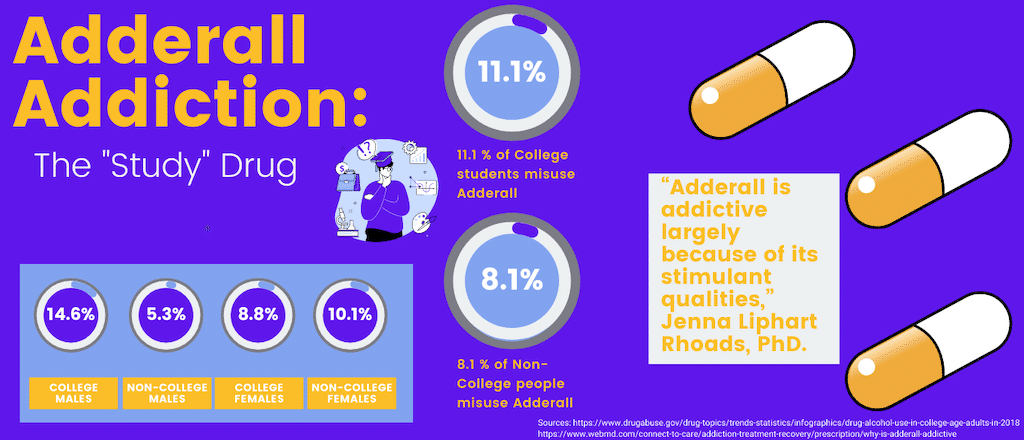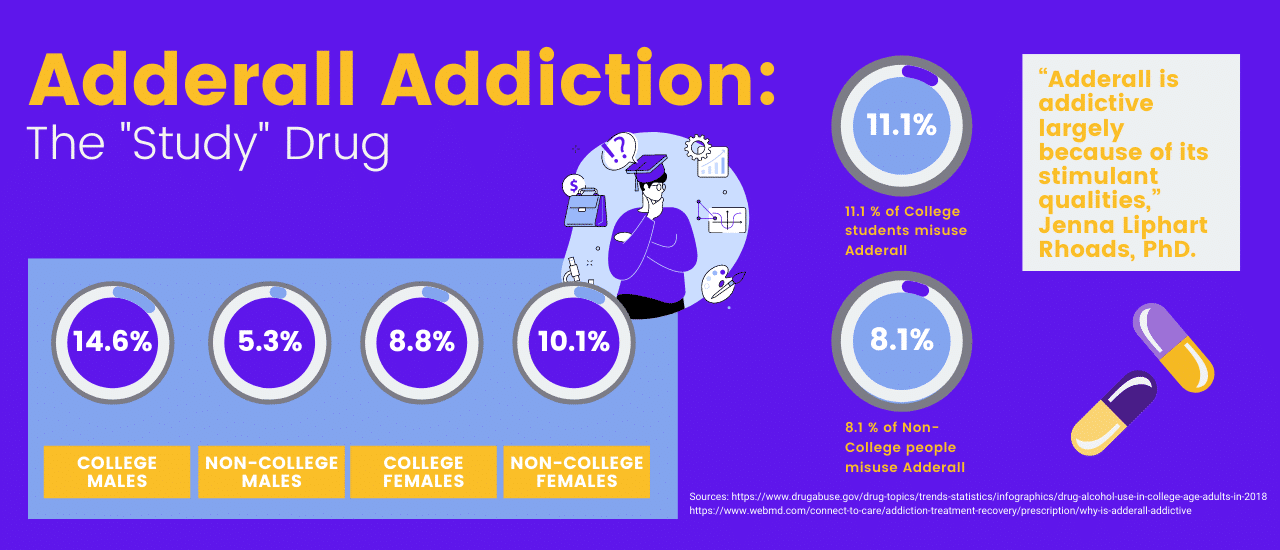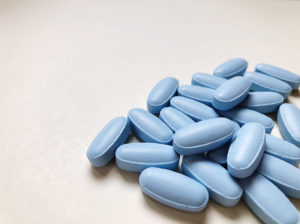A Closer Look at Adderall Addiction
Adderall can be addictive because of its amphetamine compounds. Adderall abuse is becoming more common today in both people who struggle with ADHD and those who do not due to cultural factors. It is vital to understand the signs and symptoms of Adderall addiction in order to help yourself or a loved one find recovery.
Table of Contents
If you or someone you know has been struggling with Adderall addiction, know that you are not alone. Abuse of this “study drug” has never been more common and not everyone knows how dangerous Adderall abuse can be.
Whether you’ve seen it firsthand or not, learning about the signs, causes, and risks of Adderall addiction can be helpful. If you have a loved one who is in school, it is especially important to learn about Adderall abuse because it is commonly used amongst students.

Is Adderall Addictive?
Adderall can be addictive because it is made of amphetamine compounds. For this reason, Adderall’s effect on the brain can sometimes mimic methamphetamine addiction in those who abuse Adderall. Taking the drug as prescribed by a doctor is generally safe.
Adderall is designed to treat ADHD, therefore the people who take this drug who do not struggle with this disorder can find it particularly addictive.
Recreational Adderall should never be taken because of its addictive nature, even if it comes from someone who has a prescription. Even if the drug comes from a “safe” source, it can be dangerous to anyone who doesn’t have their own prescription.
Who Abuses Adderall?
People with and without ADHD have been known to struggle with Adderall abuse, but it is more common in certain demographics.
People with ADHD
In general, Adderall and ADHD have a complementary relationship. People with ADHD are at low risk 4 of developing an Adderall addiction when they use the drug as directed by a doctor. However, people with ADHD are also more likely to abuse substances than the general population.
Adderall won’t make people with ADHD feel “high” at prescribed doses. If a person with ADHD takes more of their medication than prescribed, they can achieve a stimulant high.
Adults with ADHD have usually put up with decades of suffering from their disorder and are at a higher risk for developing an Adderall addiction. When late-diagnosis patients start taking Adderall, the relief from the medication can be so immense that they feel compelled to take more than the prescribed dose.
People with ADHD are as equally likely to abuse Adderall as those without ADHD for fun or productivity.
People without ADHD
People without ADHD have vastly different experiences with Adderall. People without ADHD can feel a stimulant high from taking a dose of Adderall that would not intoxicate a person with ADHD at all.
Many college campuses in the U.S. are rife with “Adderall culture.” Current or former college students are the group most likely to abuse Adderall 1. Recreational Adderall users may take the pills orally or crush them into a powder and snort them.
College students sometimes use large amounts of Adderall to “get through finals.” Unfortunately, once finals are over, they often find themselves addicted to it. Some high school students are also at risk for Adderall addiction especially during SAT and college preparation season.
People on college campuses may also use Adderall as a party drug. These people view Adderall the same way they view cocaine, MDMA, and other unregulated stimulants.
It can be difficult to kick an Adderall addiction after college. As a result, people who leave college and enter high-pressure workplaces can be vulnerable to Adderall abuse. Consequently, Adderall addiction disproportionately affects service workers, medical workers, executives, and anyone else who works long hours in a fast-paced environment.
Why is Adderall Abuse So Common?
Cultural factors make Adderall abuse more common these days than ever before. Understanding these factors can help you avoid falling into a toxic mindset that can lead to Adderall abuse.
Workplace Demands and "Grind Culture"
One of the reasons that Adderall abuse is so common is that workplaces and schools reward immense productivity sometimes without questioning how it was achieved. When you can accomplish a seemingly inhuman amount of work in a single day, you may get promoted, or a better grade in a class, etc.
The food service industry reports the highest rates 3 of illicit drug use in U.S. workplaces. This, in turn, leads to more frequent deaths and overdoses. In this industry, pressure to abuse Adderall may come from your peers because it may seem you can be more productive in the workplace and make better money.
The food service industry is just one example of how the pressure to “hustle” and “grind” can lead to Adderall abuse. In order to avoid falling into this toxic mindset, it’s important to remind yourself that the grind should stop at times.
Normalized Prescription Abuse
Another factor that makes Adderall abuse more common today is the normalization of prescription drug abuse.
Many people think that prescription medications like Adderall are safer than street drugs. While it is true that street drugs are more likely to be laced with unknown substances, prescription medications come with their own set of risks.
People who abuse prescription drugs are more likely to start with larger doses because they assume that prescriptions are safe. You may be less likely to monitor the way your body reacts to prescription drugs based on the assumption that these drugs are safe and legal.
Like all prescription medications, Adderall carries the risk of an allergic reaction, overdose, and negative interactions with other substances. The normalization of prescription drug abuse in certain subcultures too often causes these risks to be overlooked.
Increased ADHD Diagnoses
In recent years, doctors have diagnosed more people with ADHD than ever before. This can be seen as a positive development because it used to be very difficult for adults, women, and people of color with ADHD to get diagnosed.
Unfortunately, this also means that more Adderall is circulating among the general population. These days, almost everyone knows someone with an Adderall prescription, which makes the illicit resale of Adderall easy and common.
Since more people are now evaluated for ADHD, it is also easier to misdiagnose someone with ADHD5. There are several disorders that doctors may mistake for ADHD, including social anxiety, bipolar disorder, and autism spectrum disorders.
When someone who does not have ADHD starts taking Adderall, it is very easy for them to become addicted to it — especially when they don’t realize they are dealing with a different mental health problem altogether.
Why is Adderall Abuse So Common?
Getting familiar with these telltale signs of an Adderall addiction2 can help you distinguish if your loved one is abusing Adderall. If you use Adderall and you recognize these symptoms in yourself, we recommend considering treatment for an Adderall addiction.
Mood-Related Symptoms
When you take Adderall, it rapidly boosts your mood. You may feel energetic, motivated, and euphoric. However, this elevated mood can also make you feel irritable and more likely to “snap” at any moment.
Coming down from an Adderall high can cause you to feel even more irritable. It can also cause feelings of depression and hopelessness. If you find yourself using Adderall to boost your mood and then feel mentally drained, depressed, or irritable when it wears off you may be experiencing Adderall withdrawal.
Withdrawal is one of the first signs that you are developing an addiction. If you feel anxious or irritable when you do not know when your next dose of Adderall is coming, then your addiction has already developed.
Physical Symptoms
Adderall abuse can also have symptoms that affect your physical health.
- Reduction in appetite
- Sudden weight loss
- Headaches
- Dehydration
- Nausea
- Insomnia
In addition to physical symptoms, if you are abusing Adderall you may experience these withdrawal symptoms which generally include nausea, shaking, dizziness, and flu-like symptoms.
The Dangers of Adderall Addiction
When left untreated, an Adderall addiction can cause serious consequences. It is important to be able to recognize these signs of this addiction in yourself and others in order to avoid serious consequences.
There are both long-term and short-term consequences of Adderall abuse. If you know someone who is abusing Adderall, calmly discussing these consequences can be a good way to introduce them to the idea of getting help.
Short-Term Consequences
In the short term, Adderall addiction is most likely to lead to unpleasant lifestyle consequences. Someone who recently became addicted to Adderall is likely to impulsively spend money and engage in risky behavior.
A new Adderall addict may find themselves severely affected by the loss of sleep and appetite, and may even start to feel physically ill most of the time. New addicts may have trouble following through with basic responsibilities like the attendance of work, family obligations, and social events.
Addictions rewire the part of your brain that sorts your priorities. When you develop an Adderall addiction, it suddenly becomes very difficult to do anything that doesn’t serve the purpose of obtaining and taking the drug.
Long-Term Consequences
One of the biggest long-term risks of an Adderall addiction is the development of heart and blood pressure problems. This can be especially dangerous for men, who are more likely to deal with life-threatening cardiac events later in life.
Abusing Adderall for a long time can also cause irreparable damage to your liver. If you frequently mix Adderall with other intoxicants, such as alcohol, that damage will be even more pronounced.
Long-term Adderall abuse carries severe emotional consequences as well. Adderall addicts usually deal with drastic mood swings that can be difficult to control. These mood swings can also significantly damage the important relationships in an addict’s life.
Abuse of Unregulated Stimulants
Perhaps the most immediate danger associated with Adderall abuse is the consequent abuse of unregulated street drugs. Not only is the consumption of these drugs dangerous, but generally the process of obtaining the street drugs is highly dangerous.
Someone who regularly abuses Adderall is much more likely than the average person to develop a cocaine addiction. When an Adderall addict cannot get Adderall, they may try turning to illegal stimulant drugs like methamphetamine, MDMA, or “bath salts”. All of these drugs are highly addictive and often laced with other dangerous substances.
Treatment for Adderall Addiction
To treat your Adderall addiction a good first step is inpatient rehab. In an inpatient program, you will be under 24/7 care in a safe facility where you will have access to support and resources from licensed professionals and empathetic staff.
Individual and group therapy in an inpatient setting can help you develop new coping skills and change damaging behaviors. The skills taught and therapies used are designed to help you in your recovery from addiction and to give you a supportive network.
After you’ve completed inpatient rehab, you may move to an outpatient program to help ease your transition back to normal life. Outpatient treatment for addiction is a flexible option that does not require overnight stays. Although outpatient is less intensive than inpatient treatment, outpatient offers a variety of therapeutic interventions and services.
Seek Help For Adderall Addiction Today
If you or someone you know is struggling with Adderall addiction, seek help as soon as possible. Southern California Sunrise Recovery Center offers both detox and inpatient treatment for those struggling with many different substance abuse disorders.
At Southern California Sunrise Recovery Center we help treat addiction with a combination of evidence-based therapies and holistic methods. We come up with a personalized, comprehensive, and effective treatment plan for each individual in our care.
Contact us for more information about our inpatient rehab services and insurance coverage.
References & Resources
- American Addiction Centers , M. S. C. P. (2022, January 5). Adderall Abuse: Signs, Symptoms and Addiction Treatment. DrugAbuse.com. Retrieved January 12, 2022, from https://drugabuse.com/stimulants/adderall/
- Jones, S. (2020, June 29). Adderall Abuse and Addiction: Symptoms and Warning Signs. WebMD. Retrieved January 12, 2022, from https://www.webmd.com/drug-medication/adderall-abuse-addiction-signs
- Kaliszewski, M. (2020, February 19). Restaurant Workers and addiction – statistics, Recovery & Treatment Options. American Addiction Centers. Retrieved January 12, 2022, from https://americanaddictioncenters.org/rehab-guide/workforce/blue-collar-workers/restaurant-hospitality
- Larry Silver, M. D. (2022, January 3). Signs of Adderall Addiction. ADDitude. Retrieved January 12, 2022, from https://www.additudemag.com/signs-of-adderall-addiction/
- Porter, E. (2021, August 9). Conditions that MIMIC ADHD. Healthline. Retrieved January 12, 2022, from https://www.healthline.com/health/adhd/adhd-misdiagnosis
Clinically Reviewed By
Dawn Masick, LMFT
Dawn has experience dealing with various relational, emotional, and psychological struggles. Dawn’s training has prepared her to work with children, teens, young adults, adults, couples, and families. She has undergone training in DBT, TF-CBT, and Family Therapy. Other competencies include dealing with ADHD, mood/anxiety disorders, parenting challenges, addiction, PTSD, co- dependency, and relationship issues. I have experience in residential, school-based mental health, children’s community mental health, victims of crime (VOC), and private practice settings.
Dawn has been committed to guiding clients through their trauma, coming alongside them in their healing, and supporting them as they navigate life changes. Dawn’s passion is working with clients struggling with trauma in substance abuse and mental health.



